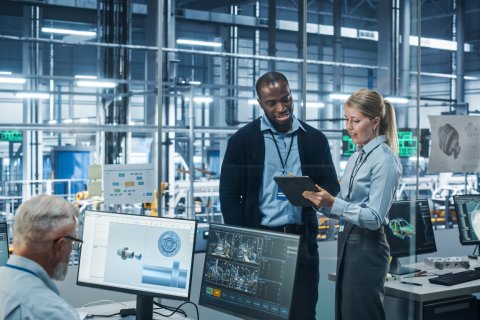Artificial Intelligence and labour market developments

Professor of Economics & Institutions Maarten Goos recently shed more light on the impact of Artificial Intelligence on labour market developments. In a mini-masterclass for the Nederlands Genootschap Sociale Zekerheid (the Dutch Society for Social Security), he explained in what way economic inequality can be a result of the deployment of AI. Automation has created many new jobs, but the quality of these jobs lags behind. He also gave insights into research on the significance of Artificial Intelligence (AI) for the future of work in the filmed podcast Wake Up Call, aimed at students. Watch the videos of both interviews with Goos here.
Mini-masterclass: Artificial Intelligence and the Future of Work
Jonneke Bolhaar (sector head of labour and knowledge at the CPB Netherlands Bureau for Economic Policy Analysis) engaged in a conversation with Maarten Goos (Professor of Economics & Institutions at Utrecht University and Institute Gak). During this Mini-Masterclass, they explored the impact of Artificial Intelligence on the future of work.
Research shows that Artificial Intelligence leads to job losses, but also to the creation of new jobs. In some of these new jobs, such as warehouse workers in distribution centres or parcel delivery services, work is essentially controlled by algorithms. This algorithmic management of jobs leads to a breakdown of the traditional employment relationship between employers and employees. It is also leading to an increasing use of subcontracting, franchising, and the use of agency contracts, self-employment, or payrolling.
Artificial Intelligence will be a gamechanger. We need to look closely at what that means. We have the right institutions to do so, but this involves substantial work for them.
Goos also highlights the economic impact of Artificial Intelligence on work and inequality. Automation has created many new jobs, but the quality of these jobs lags behind. Algorithmic work in large distribution centres creates a high workload for lower-skilled staff. Labour law compliance is also under pressure. There shows a clear task and responsibility for the government and regulators, he believes.
Yet Goos sees more opportunities than threats coming from the deployment of Artificial Intelligence: Technology has led to rising living standards throughout history. For the labour market, Artificial Intelligence will be a gamechanger. We need to look closely at what that means. We have the right institutions to do so, but this involves substantial work for them.
Podcast: Wake Up Call – episode 16
For the Wake-Up Call podcast Maarten Goos spoke with Milda and Vishwa. They interviewed him on behalf of the current generation of students and their uncertainties about the future of work. During this podcast episode, Goos responds to specific questions about technological innovation and the effects on the labour market, job polarisation, inequality and the income gap, labour market shortages, the need for training and education, and: about the importance of regulation.
Why not develop AI that complements workers instead of automating processes and work?
We definitely need to regulate,
says Goos. And, especially in Europe, we are trying to do that. If we wouldn’t, there is this danger that AI might not have the societal impact that is best. Research has been done in the US that shows that it’s 3-4% of the firms that are adopting AI are mainly the larger firms. In terms of workers exposed to AI you’re talking about 25-30% of workers. One of the main reasons to adopt AI in the private sphere is to automate processes. If we let that go unmanaged, that might hurt workers a lot more than we think is desirable from a more societal point of view.
Why not develop AI that complements workers instead of automating processes and work? And what about the ethical concerns and privacy concerns regarding AI?’ Goos asks. ‘Machine learning has the power to process and the access to big data, making better predictions than statistics. That is also why data, and how we regulate (access to) them is so important.
And then there are other concerns, such as social media and how the media influence our democratic processes. There is a lot that we need to think about and if necessary, manage.
Watch the full video:
Maarten Goos is full professor of Economics and Institutions, affiliated with Instituut Gak, the Utrecht University School of Economics, and the Future of Work Hub of Institutions for Open Societies of Utrecht University.
Please read more about this research on societal developments and the impact on work and the labour market: https://www.uu.nl/en/news/multi-year-research-into-the-changing-world-of-work

